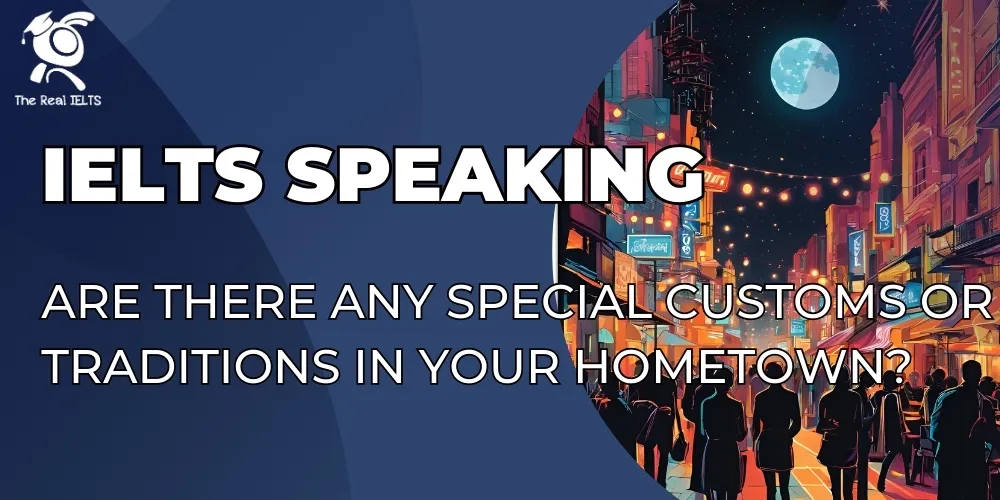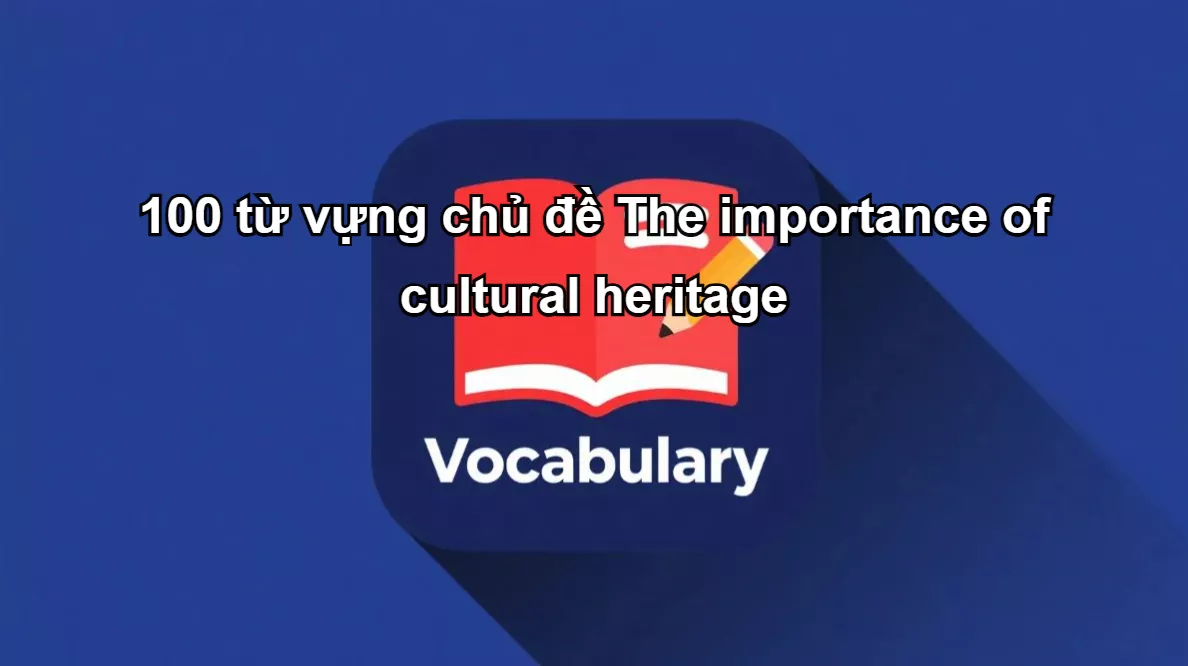IELTS Speaking về phong tục quê hương là chủ đề thú vị. Quê tôi nổi tiếng với lễ hội truyền thống như lễ hội đua thuyền. Học cách miêu tả các phong tục độc đáo để chinh phục giám khảo trong bài thi này.
Đọc thêm các bài luyện thi IELTS khác.
Đọc thêm câu hỏi khác tại: IELTS Speaking Part 1: Introduction and Interview chủ đề Your hometown.
Đọc thêm: IELTS Speaking: Do many people in your hometown travel abroad?
Câu trả lời cho IELTS Speaking: Are there any special customs or traditions in your hometown?
Ví dụ 1
Certainly! My hometown, a small but vibrant town in Vietnam, is rich in customs and traditions that reflect the deep cultural roots of the region. One of the most prominent traditions is the celebration of Tết Nguyên Đán, or the Lunar New Year. This is not just a time for family reunions but also for numerous unique practices. For example, during Tết, it’s customary for people to visit their relatives and friends, bringing along small gifts such as bánh chưng (sticky rice cakes) or red envelopes filled with money, symbolizing good luck and prosperity.
Another distinctive custom is the practice of ancestor worship. In most households, there’s a dedicated altar where offerings like fruits, incense, and tea are placed to honor the spirits of deceased family members. This tradition strengthens the bond between generations and serves as a way for us to express gratitude for our roots.
In addition, my hometown has a fascinating tradition tied to its agricultural heritage. Every year, there’s a Rice Planting Festival where farmers and community members gather to celebrate the start of the planting season. It’s a lively event with traditional dances, music, and even rituals to pray for a bountiful harvest. These activities not only preserve the local culture but also foster a strong sense of community.
Finally, there’s a less formal but equally interesting tradition involving street food culture. In the evenings, the streets come alive with vendors selling local delicacies like phở, bánh mì, and chè. Sharing these meals with family or friends has become a cherished way of life, bringing people together over delicious food.
These customs and traditions are not only a source of pride but also a testament to the richness of our heritage. I believe they help preserve our identity in a rapidly changing world, and I’m always excited to share them with visitors or friends from other regions.
Ví dụ 2
Yes, there are quite a few unique customs and traditions in my hometown, which is located in a rural area of Vietnam. One of the most significant is the Mid-Autumn Festival, or Tết Trung Thu. During this festival, families come together to celebrate under the full moon, which symbolizes unity and happiness. Children carry colorful lanterns and enjoy traditional treats like mooncakes, while adults use the occasion to strengthen family bonds. It’s a magical time, filled with laughter and joy.
Another tradition that stands out is the Spring Festival, or Hội Xuân, which typically takes place after the Lunar New Year. This festival includes various cultural activities such as lion dances, traditional games like tug-of-war, and singing competitions. One highlight is the wrestling competition, which attracts participants from neighboring villages. It’s not just about winning but also about showcasing strength, skill, and sportsmanship.
In my hometown, we also observe a unique wedding tradition. Before the actual wedding day, there’s a ceremony called “asking for the bride,” where the groom’s family formally visits the bride’s home to seek her family’s approval. This involves an exchange of gifts, such as betel leaves, areca nuts, and tea, which symbolize respect and goodwill. The ceremony is deeply rooted in our culture and reflects the importance of family approval in marriage.
Lastly, there’s a weekly custom that I find very special — the Sunday market. This isn’t just a place to buy and sell goods; it’s also a social event where people catch up with each other, share news, and exchange stories. It’s a tradition that keeps the sense of community alive and thriving.
Overall, these customs make my hometown a wonderful place to live, as they bring people together and remind us of our cultural values. I feel very lucky to be part of a community that treasures these traditions so deeply.
Ví dụ 3
Absolutely! My hometown is known for its rich cultural heritage, and one of the most special traditions is the Lantern Festival, which takes place on the 15th day of the lunar month. During this time, the entire town is illuminated with colorful lanterns, and people gather near the river to release small, candle-lit lanterns onto the water. This is believed to bring good luck and happiness, and the sight of hundreds of glowing lanterns floating down the river is truly unforgettable.
Another unique tradition is the celebration of Village Festivals, which are held annually to honor the local guardian deities. These events often include a grand procession, where villagers carry offerings to the communal temple. Traditional performances such as folk dances and chèo singing are also a big part of the festival. It’s not just a religious event but also a time for everyone in the community to come together and celebrate their shared identity.
In addition, we have a beautiful custom related to respecting teachers. On November 20th, which is Teacher’s Day in Vietnam, students, both young and old, visit their teachers to express gratitude. Gifts like flowers or handwritten cards are given, and it’s a heartfelt gesture that emphasizes the importance of education and respect in our culture.
Lastly, food plays an important role in our traditions. During festivals or family gatherings, dishes like bánh tét, gỏi cuốn, and canh chua are often prepared. What’s special is that the cooking process itself is considered a bonding activity, where family members come together to share stories and create memories.
These customs not only preserve our cultural identity but also create a strong sense of belonging. Whenever I think about these traditions, I feel proud of where I come from and grateful to be part of such a vibrant community.
Ví dụ 4
Yes, there are several special customs and traditions in my hometown that reflect our cultural identity and way of life. One of the most cherished traditions is the communal New Year offering ceremony. Every Lunar New Year, families in our community gather at the local temple to make offerings to the deities and ancestors. This ceremony symbolizes gratitude for the blessings of the past year and hopes for prosperity in the coming one. It’s a deeply spiritual experience that brings everyone together.
Another unique custom is the Harvest Festival, which takes place at the end of the rice harvesting season. This is a time when farmers celebrate their hard work and success by organizing traditional games, cooking feasts, and performing folk songs. One interesting aspect of this festival is the offering of the first rice grains to the village elders, symbolizing respect for their wisdom and guidance.
In addition, my hometown is known for its calligraphy tradition, especially during the weeks leading up to the Lunar New Year. Local artisans set up stalls in the market to write meaningful phrases or blessings on red paper. These calligraphy works are hung in homes to bring good fortune and happiness throughout the year. Watching the calligraphers work is a fascinating experience, as they skillfully combine art and poetry.
Finally, there is a deeply rooted tradition of community volunteering. Whenever a family faces difficulties, such as a house needing repair or help during planting season, neighbors always come together to lend a hand. This spirit of mutual support, called “lá lành đùm lá rách,” meaning “the good leaves protect the torn ones,” is something that I think makes my hometown very special.
These traditions not only preserve our cultural heritage but also strengthen the bonds between people. They remind me of the values of kindness, respect, and unity that are so central to our community.















